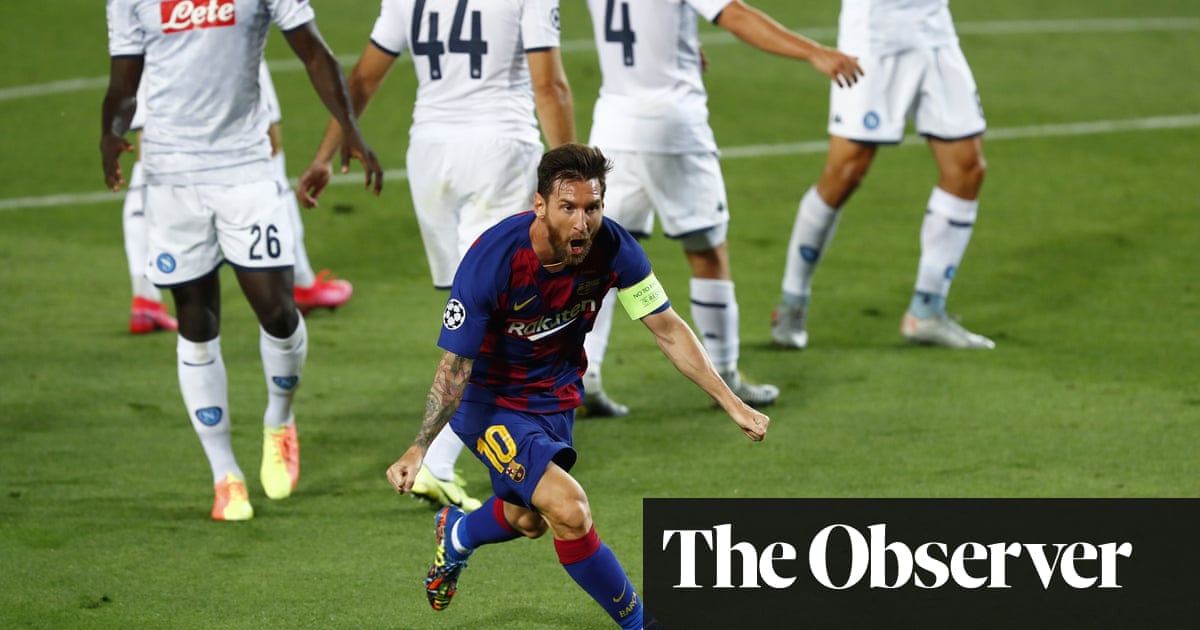
Progress for Barcelona, and yet the spectre of a first trophyless season since 2008 somehow seems to loom larger than ever. They made it past Napoli and into the Champions League quarter-finals, but with the sort of leaden, listless display that makes it almost impossible to envisage them holding aloft the trophy in Lisbon on 23 August. Almost.
That they have even a puncher’s chance is due largely to the man who was again their salvation in this game. Any team with Lionel Messi pointing in the right direction can never quite be counted out, and here it was his unshakeable balance and insoluble will that brought him within three wins of the prize he craves more than any other.
And yet on this evidence – a continuation of the anaemic, disjointed football that saw them pipped to the La Liga title by Real Madrid – Barcelona feel further from the pinnacle of the game than they have done at any point since Messi’s arrival.
Quique Setien’s side – although only just, if reports from Catalonia are to be believed – still look painfully short in key areas. Injuries have hit them hard, but harder than they should probably be hitting a club that has spent £767m on transfers in the last seven seasons. The lack of anything remotely approaching a pressing game, or even the poise to dominate a midfield as they once did so instinctively, goes beyond personnel. In many ways, this game was the modern Barcelona in microcosm: two set-piece goals, a slice of Messi brilliance, and not much else. It may be a blueprint, and frequently an effective one at that. But it looks nothing like an identity.
Has there been a Barcelona team since the dog days of the Frank Rijkaard era that has looked so inelegant in possession, so inert out of it, so content to let opposition teams play? Gennaro Gattuso’s Napoli are a spirited but by no means flawless unit, as their indifferent Serie A form indicates. Yet here, at a deserted Camp Nou, they were handed the keys to the place, and with a deader eye for goal might even have snatched the tie outright.
To be fair, most of their 18 shots (to Barcelona’s seven) were blocked, and most came after Barcelona had already made the tie safe in the first 45 minutes.
That they did so was largely due to the luminosity of Messi and the caprice of VAR rather than any winning strategy. Napoli actually started the better and, had Dries Mertens hit the target within 90 seconds rather than slicing his shot against the post, we might have been discussing a very different game.
Instead, Barcelona restored regular service after 10 minutes, Clément Lenglet heading home Ivan Rakitic’s corner having first shoved Diego Demme into Kalidou Koulibaly, taking them both out. With the game a quarter through, Messi tumbled to the turf under the twin challenges of Lorenzo Insigne and Mário Rui, and yet somehow still managed to scramble to his feet.
With the ball, of course: this is Messi, after all, and as he regained his balance the ball somehow clung to him like a faithful dog. With his footing giving way again, he somehow managed to hold himself upright for just long enough to curl the ball past David Ospina and into virtually the only square of goal that the goalkeeper was unable to reach.
In a largely drab game, this was the one real moment of grace: a reminder that for all the dross around him, Messi can still generally be relied on to raise the tone.
It could have been still worse for Napoli, but Messi’s second goal – courtesy of a delicious cross by Frenkie de Jong – was chalked off by the VAR for a faint handball. Still, when Luiz Suárez slammed home a penalty on the stroke of half-time, after Koulibaly had clipped Messi’s calf, Napoli were 3-0 down, and seemingly out.
But in the very last twitches of the first half, Napoli pulled a goal back: Insigne converting from the spot after Rakitic had brought down Mertens. If this was a reminder to Barcelona of their own essential fallibility, then it was one that went unheeded: Napoli dominated the second half without ever quite threatening to unlock the grandstand finish. Remarkably, Setien waited until the 84th minute before using the first of his 12 available substitutes, by which time Hirving Lozano and Arkadiusz Milk had already come close to narrowing the deficit.
Full time was greeted with the usual muted celebrations, the usual desultory handshakes and fist-bumps. A rumbling discontent has long infused this club, one that on its worst days seems immune even to victory. Laboured, sluggish and dangerously reliant on one man’s miracles: this is the Barcelona of 2020, and for all the surgery this great club requires, things may yet get worse before they get better.
from Football | The Guardian https://ift.tt/2DpN4S0
via IFTTT

No Comment